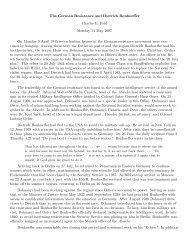Dietrich Bonhoeffer a discussion of the film Bonhoeffer: Agent of ...
Dietrich Bonhoeffer a discussion of the film Bonhoeffer: Agent of ...
Dietrich Bonhoeffer a discussion of the film Bonhoeffer: Agent of ...
You also want an ePaper? Increase the reach of your titles
YUMPU automatically turns print PDFs into web optimized ePapers that Google loves.
kept well informed on political developments from <strong>the</strong> very beginning <strong>of</strong> <strong>the</strong> Nazi accession to<br />
power. As Hans moved into resistance activities, <strong>Dietrich</strong> followed his activities carefully. He had<br />
been participating in meetings <strong>of</strong> <strong>the</strong> conspirators since <strong>the</strong> fall <strong>of</strong> 1939. When told that Oster<br />
would inform <strong>the</strong> Dutch <strong>of</strong> <strong>the</strong> impending attack, <strong>Dietrich</strong> approved. Far from needing Hans to<br />
confront him with evidence <strong>of</strong> Nazi activities, <strong>Dietrich</strong> had a thorough knowledge <strong>of</strong> what Hitler<br />
and his followers were doing.<br />
Indeed, <strong>the</strong> conspirators, especially Hans, were attracted to <strong>Dietrich</strong>. His extraordinary personality<br />
helped <strong>the</strong>m come to decisions on questions that <strong>the</strong>y faced. Eberhard Bethge gave <strong>the</strong><br />
following description <strong>of</strong> <strong>the</strong> close relationship that developed between Hans and <strong>Dietrich</strong> after his<br />
return to Germany.<br />
Perhaps [Hans] was annoyed by Klaus <strong>Bonhoeffer</strong>’s slight difficulty in making decisions. As a<br />
lawyer, Klaus constantly had new ideas and visions <strong>of</strong> <strong>the</strong> possibilities in any given situation;<br />
Hans von Dohnanyi found this more a hindrance that a help. But he felt that in <strong>Dietrich</strong>,<br />
even <strong>Dietrich</strong> <strong>the</strong> <strong>the</strong>ologian, he found a stronger sense <strong>of</strong> reality; and in fact, <strong>Dietrich</strong> possessed<br />
an unusual capacity to help o<strong>the</strong>r people arrive at decisions.<br />
Thus Dohnanyi confided in no one more during this period than in <strong>Dietrich</strong> <strong>Bonhoeffer</strong>.<br />
Almost everyone else commented on Dohnanyi’s abrupt and reserved manner, but <strong>Dietrich</strong><br />
<strong>Bonhoeffer</strong> met his bro<strong>the</strong>r-in-law as <strong>of</strong>ten as possible when he was in Berlin. Dohnanyi introduced<br />
him at a relatively early point to <strong>the</strong> inner circle <strong>of</strong> conspirators, and asked <strong>Bonhoeffer</strong><br />
one evening what he thought about <strong>the</strong> New Testament passage “all who take <strong>the</strong> sword will<br />
perish by <strong>the</strong> sword” (Mat<strong>the</strong>w 26:52). <strong>Bonhoeffer</strong> replied that this held true for <strong>the</strong>ir circle<br />
as well. They would have to accept that <strong>the</strong>y were subject to that judgment, but <strong>the</strong>re<br />
was now a need for such people who would take <strong>the</strong> responsibility for deciding its validity for<br />
<strong>the</strong>mselves.<br />
Imprisonment and interrogation<br />
<strong>Dietrich</strong> was arrested on 5 April 1943 and imprisoned in Tegel, a military prison in Berlin.<br />
In <strong>the</strong> <strong>film</strong>, <strong>the</strong> military prosecutor Manfred Roeder is portrayed as dominating <strong>the</strong> interrogation<br />
sessions while <strong>Bonhoeffer</strong> appears defensive and silent. According to <strong>the</strong> biography, however,<br />
<strong>Bonhoeffer</strong> actively responded to <strong>the</strong> interrogation and skillfully misled Roeder. We know this in<br />
part because <strong>Bonhoeffer</strong>, after interrogation sessions, wrote extensive responses to Roeder which<br />
have survived. Though <strong>the</strong> <strong>film</strong> does not show Roeder achieving anything through his interrogation,<br />
<strong>Bonhoeffer</strong>’s accomplishment is not adequately conveyed. It seems to me that <strong>the</strong> screenplay<br />
is not able to portray <strong>the</strong> menace posed by <strong>the</strong> interrogation. Roeder is portrayed as a skillful<br />
but not terribly menacing figure, despite <strong>the</strong> warning about him given to Maria by Knobloch,<br />
<strong>the</strong> Tegel prison guard. Indeed, Roeder appears as an almost benign figure in <strong>the</strong> totally implausible<br />
scene <strong>of</strong> Maria’s second visit, when she is portrayed as whispering conspiratorial information<br />
to <strong>Dietrich</strong> in Roeder’s presence. A later scene, in which Maria is portrayed pleading with<br />
<strong>Bonhoeffer</strong> to follow through on <strong>the</strong> planned escape while Roeder stands in <strong>the</strong> background, is<br />
even more implausible. As far as I am aware both <strong>of</strong> <strong>the</strong>se scenes are fictional.<br />
Knobloch, <strong>the</strong> Tegel guard who began to assist <strong>Bonhoeffer</strong>, seems, in <strong>the</strong> <strong>film</strong>, to respond<br />
more out <strong>of</strong> pity than respect. At one point in <strong>the</strong> <strong>film</strong>, after a visit by Maria, he asks <strong>Dietrich</strong><br />
“Tell me, what does a girl like that see in you.” Indeed, <strong>the</strong> question is invited by <strong>the</strong> <strong>film</strong>’s portrayal<br />
<strong>of</strong> <strong>Dietrich</strong>. We hardly see <strong>the</strong> powerful influence that <strong>Dietrich</strong> had not only on Knobloch,<br />
8



